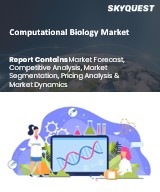
Report ID: SQMIG35A2634

Report ID:
SQMIG35A2634 |
Region:
Global |
Published Date: February, 2024
Pages:
165
|
Tables:
90 |
Figures:
76
Given the presence of multiple significant competitors, the computational biology market is predicted to become extremely competitive in the near future. Mid-size to smaller businesses are expanding their market presence by releasing new products with lower prices as a result of rising technical breakthroughs and product innovations. Major companies in the market are concentrated on developing new items to extend their product portfolio as well as on implementing collaborative methods to increase their market share. For instance, Genedata, AG released Genedata Imagence 2.0, the most recent iteration of its corporate software for high-content screening (HCS) image analysis, in May 2020.
Top Players in the Computational Biology Market
Computational Biology Market Recent Development
Our industry expert will work with you to provide you with customized data in a short amount of time.
REQUEST FREE CUSTOMIZATIONWant to customize this report? This report can be personalized according to your needs. Our analysts and industry experts will work directly with you to understand your requirements and provide you with customized data in a short amount of time. We offer $1000 worth of FREE customization at the time of purchase.

Report ID: SQMIG35A2634